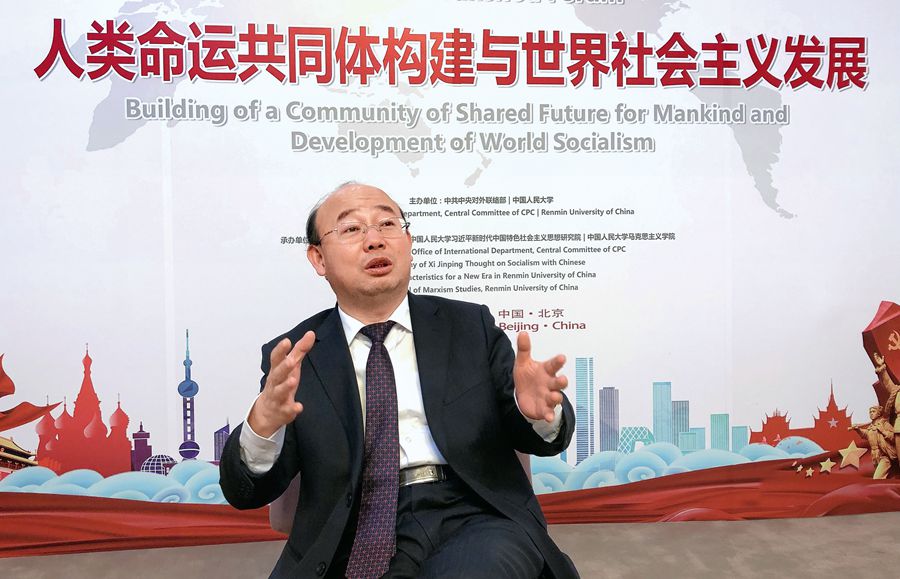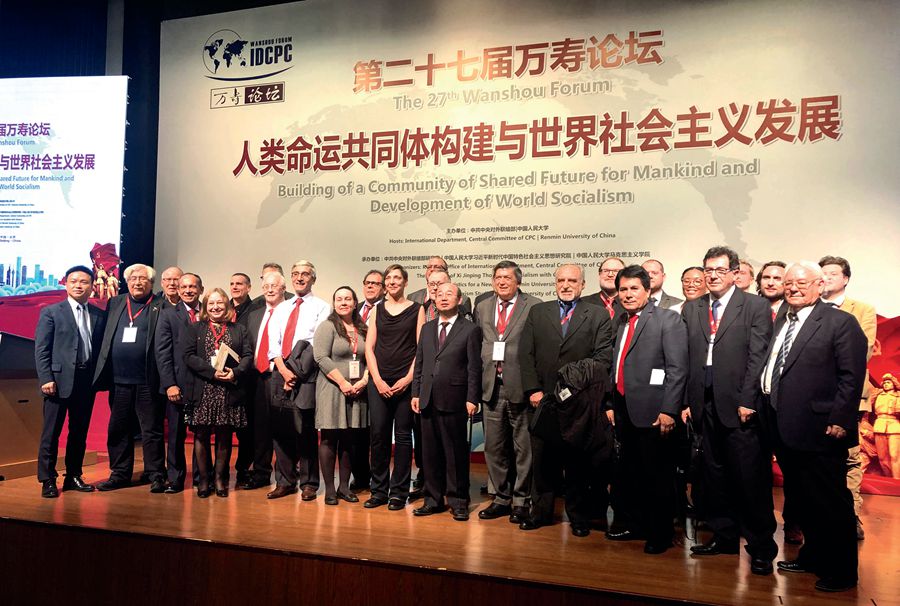ON the eve of the Two Sessions, the International Department of the Communist Party of China (CPC) Central Committee and the Renmin University of China jointly hosted the 27th Wanshou Forum in Beijing on February 28, with the theme of “The Building of a Community of Shared Future for Mankind and the Development of World Socialism.” Leaders and representatives of 13 communist parties from 11 countries of Europe and America as well as Chinese experts attended the forum.
The concept of a “community with a shared future for mankind” has been increasingly gaining the recognition of the international community since it was put forward, while at the same time, a brand-new sense of worth committed to addressing the common challenges of humanity has quietly emerged. With the convening of the annual Two Sessions of China’s top legislative and advisory bodies, once again the eyes of public opinion from home and abroad are riveted on China’s unique political system. On the sidelines of this forum, Luan Jianzhang, director of the Research Office of the International Department of the CPC Central Committee received an interview with China Today and gave his analysis concerning the above topics.

Luan Jianzhang, director of the Research Office of the International Department of the CPC Central Committee.
China Today: Since the end of the cold war, the development of the world socialist movement has remained at a low ebb as a whole, while socialism in China is active and full of vitality. What do you think is the most important reason for that?
Luan Jianzhang: I think this question can be answered from two dimensions. One dimension is that we have adhered to the localization of Marxism in China, which is vitally important. Pursuing the combining of the basic principles of Marxism with China’s reality is our major guiding idea. From our revolution to the construction of our country, then to our reform and opening-up, we have adhered to the combination — this is a very important reason for our success. But another dimension, which is perhaps not talked about much, is the theories and policies we have developed in the process of the combination, both catering to China’s development need and conforming to the development trend of the whole world or human society. This is also very vital. Our foothold must start from the current reality of what China is, but certain policies and measures which we adopt should also be in line with the development direction of the whole world. For example, the beginning of our reform and opening-up was certainly based on our own current situation, such as the priority areas for the opening-up. However, our perseverance in opening up to the outside world is based on our judgment of the developmental trends of the world as a whole, and a profound grasp of the general trend of economic globalization. Therefore, no matter what difficulties we may encounter in our development, we will always adhere to the general direction of opening-up. For example, giving full play to the decisive role of the market in the allocation of resources and better fulfilling the role of the government is also in line with the law of world economic development. Since the development of capitalism, the role of the government has never been withdrawn. Consequently, the success of socialism with Chinese characteristics should be understood from these two aspects. Otherwise, merely considering the current reality of our country while ignoring the general trend of world development, the road may become increasingly narrower. The theory and practice of socialism with Chinese characteristics incorporate the general trend of world development, the law of world development, and the general direction of human development. Therefore, the localization of Marxism in China is a combination of China’s reality with the features of the times. This is the fundamental cause for the success of socialism with Chinese characteristics.
China Today: Where do you think our strengths lie?
Luan Jianzhang: We have numerous advantages, the biggest of which is our adherence to the CPC leadership. The general characteristics seen in the current world situation are fragmentation, chaos, and change. In such a chaotic environment, there are many uncertainties. Yet, adherence to the CPC leadership is the greatest certainty in China and of the world for that matter. You can imagine, if China had followed the path of the United States and other Western countries, adopting their political system, the world would never be the same as it is today. So for this reason, our primary strength lies in the CPC leadership. We are capable of concentrating our efforts on major objectives, integrating varied resources, and mobilizing all positive factors to deal with the uncertain factors.
In addition to this, we also have another great edge — our culture. In a changing world, Chinese culture is the most dynamic. Chinese culture has no fear of changes, as the ancient Chinese saying goes, “Change is for adaption, which can lead to long-term development.” We can see from this that Chinese culture is extremely adaptable. We will continue to stay in line with the general changes of the world. For example, the initiation of the reform and opening-up came about as the result of making corresponding changes to the changing world.

Attendees to the 27th Wanshou Forum pose for a group photo.
Another feature of our culture is inclusiveness. For example, “a community with a shared future for mankind” also reflects the inclusiveness of our culture, stressing that we are all members of the human family, and that there is no need to exclude one another, a theory which stands out in sharp contrast to the thought of “binary opposition” and the “zero-sum game” exhibited in Western culture.
China Today: The concept of “a community with a shared future for mankind” has won an increasing amount of international recognition since it was put forward, how do you understand this concept?
Luan Jianzhang: With the development of economic globalization, the world has become increasingly interdependent, and now it is a reality that all countries are interconnected. A slew of common interests need to be safeguarded, and numerous common problems need to be resolved. Consequently, this inspires us to build a community with a shared future for mankind. Meanwhile, we can notice that some new problems have emerged in the world today, such as anti-globalization, the rise of populism and protectionism, as well as other extremist trends. These issues pose a threat to human society as a whole. To resolve these problems, we also need to build a community with a shared future for mankind that pulls together in times of trouble.
The topic discussed in today’s forum is the relationship between the building of a community with a shared future for mankind and the development of world socialism. I would like to emphasize one point that the building of a community with a shared future for mankind is not equal to building up communism in the world. The public should not take China’s proposal to build a community with a shared future for mankind as a push towards imposing the socialist system on the international community, for this is not the case. From the perspective of ultimate concern for human beings and the solution of some common problems in the world, there is something in common between the building of a community with a shared future for mankind and socialism, and the two should be mutually supporting, but not exactly the same. The building of a community with a shared future for mankind, which adheres to the unity of problem-orientation and goal-orientation, is a scientific world outlook and methodology, as well as a brand-new value concept, while socialism is more a social system and ideology. These two should not be confused.
China Today: Compared with the Western political system, what advantages do you think China’s political system has?
Luan Jianzhang: The establishment of any political system is related to the unique economic and cultural foundation of the nation, and has its own advantages and characteristics. In my opinion, the prominent feature of China’s political system is embodied in political consultations that focus on long-term and fundamental interests of the country, rather than on the so-called confrontational contention of votes. If the wider public is pursuing short-term interests, it is impossible to shape a genuine political consensus. So I hold that the concept of political consultation is a conceptual public product that China presents to the world. Everyone consults about what to do instead of confronting each other when it comes to addressing issues. If politics is polarized and society becomes divided, everyone is locked in a row when meeting, making major accomplishments very difficult to achieve. I would like to emphasize that upon encountering the evolution of the global political party patterns and the rise of populist political parties, China’s unique system about political parties is increasingly displaying global significance, which is a major contribution to human political civilization. China’s institutional advantages and our confidence are thus exhibited in this field.

